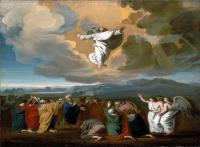
Luke is the only one of the evangelists who gives a detailed account of the Ascension of Our Lord into Heaven, in the first chapter of Acts. His narrative acts as a recapitulation of the main points of his gospel, so that his readers have an understanding of how Jesus' mantle was passed on to the apostles, as Elijah’s was passed to Elisha (2 Kings 13-15). Yet they do not yet seem to have fully grasped the message they had to preach, since they were still talking about “restoring the kingdom to Israel”.
Luke’s description of the Ascension is a drama, which in its symbolism of ascent and clouds conveys the truth that Jesus, God Incarnate, returned to the Father. The real leave-taking, however, took place at the Last Supper; and in John’s gospel in the Discourses, Jesus made it plain that he was going to the Father (John 16:10). At this point the disciples were bewildered and sorrowful, but in the story in Acts they returned to Jerusalem joyfully. The fact that the Lord had led them away from Jerusalem, rather than to it, suggested that his purpose as Messiah was very different to what people had imagined.
The long version in Mark’s gospel, which we read today, details the Lord’s last instructions to his apostles, promising them his protection. For Mark, the carrying on of Jesus' work seems more important than the manner in which he ascended to the Father.